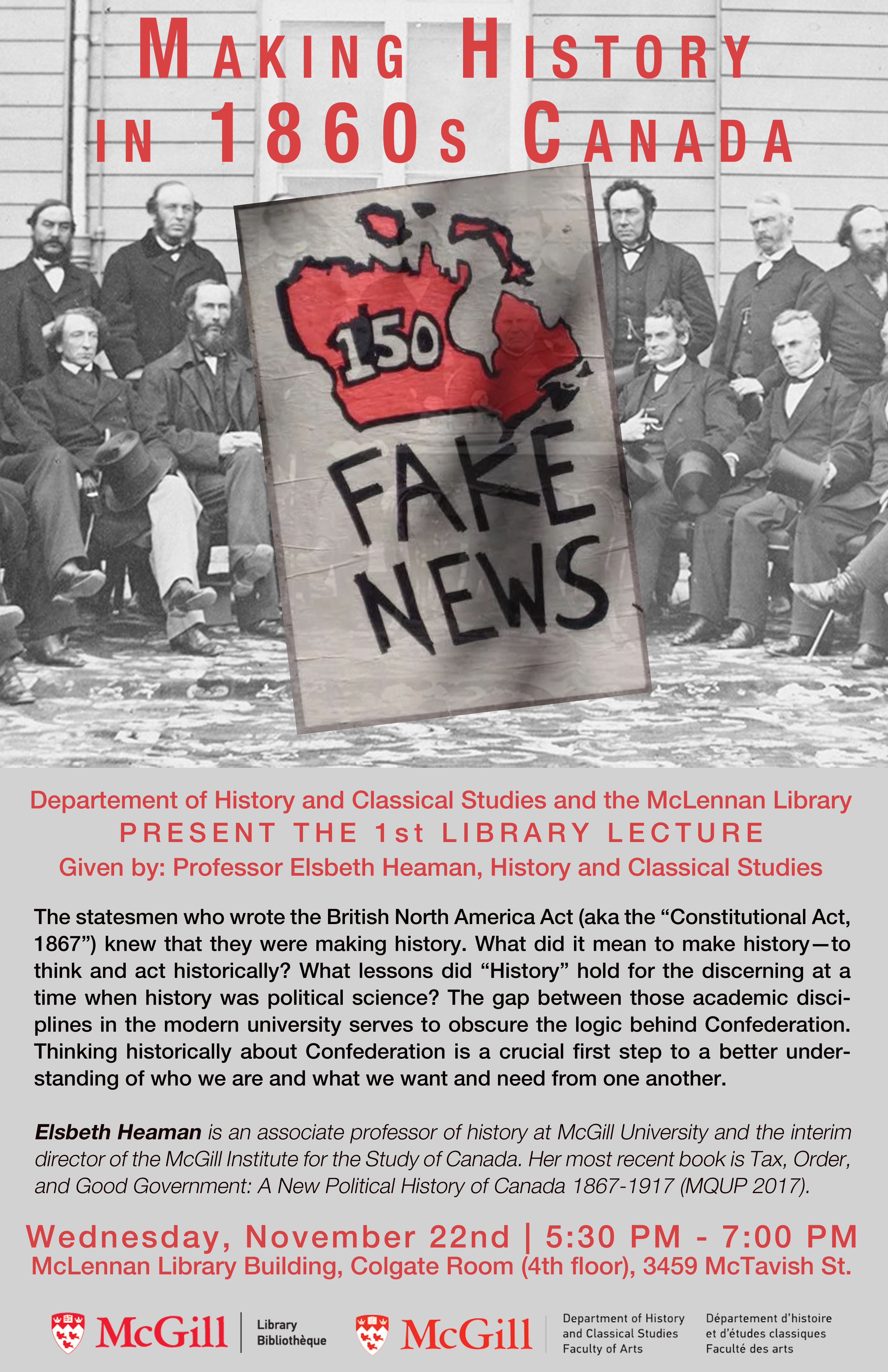Talk given by Dr. Elsbeth Heaman and co-hosted by ROAAr, McGill Library, the Department of History and Classical Studies, and MISC
When: November 22, 2017
Location: Colgate Room, McLennan Library Building, Colgate Seminar Room, Rare Books and Special Collections (4th floor), 3459 rue McTavish, Montreal, QC, H3A 0C9, CA
Description
French description below.
Canada celebrated 150 years of Confederation this year. Prof. Elsbeth Heaman marked that anniversary with a lecture that illuminated the historical realities surrounding confederation in the 1860s. The statesmen who wrote the Constitutional Act of 1867 knew that they were making history. What did it mean to make history- to think and to act historically? What lessons did “History” hold for the discerning at a time when history was a political science? The gap between those two academic disciplines in the modern university obscures somewhat the logic behind Confederation. Thinking historically about Confederation is a crucial first step to a better understanding of who we are, what we want, and what we need from each other.
Heaman explored these questions in her lecture. She also spoke on the relationship between Scottish-Enlightenment narratives of civilization, British constitutional history, English-French perplexities, and the peculiarly illiberal governance of Indigenous peoples in 1860s Canada. A display of Archival and Special collections materials complemented Heaman’s lecture. The selections combined David Hume materials and editions of his History of England from McGill’s extensive Enlightenment collection with selections of McGill historical course listings and topics from 1869-73, courtesy of the McGill University Archives. Heaman animated this material and brought the 1860s to life for an evening in 2017.
Cette année, le Canada a célébré le 150e anniversaire de la Confédération. La professeure Elsbeth Heaman a souligné cet anniversaire par une conférence qui a dévoilé les réalités historiques entourant son avènement dans les années 1860. Les hommes d’État qui ont rédigé la Loi constitutionnelle de 1867 savaient qu’ils écrivaient une page d’histoire. Que signifiait le fait de penser en fonction de l’Histoire et de laisser sa marque? Quelles leçons l’« Histoire » recèle-t-elle pour un témoin judicieux à une ère où il s’agissait d’une science politique? L’écart entre ces deux disciplines dans le cercle universitaire moderne brouille quelque peu la logique qui sous-tend la Confédération. Il est essentiel de jeter un regard historique sur la Confédération pour commencer à mieux comprendre notre identité, nos aspirations et nos attentes réciproques.
Au cours de sa conférence, Mme Heaman a exploré ces questions et traité de la relation entre les portraits de la civilisation issus des Lumières écossaises, l’histoire constitutionnelle britannique, la complexité des rapports franco-anglais et de la gouvernance singulièrement intolérante des Autochtones dans le Canada des années 1860. La conférence s’accompagnait de la présentation de documents extraits des Archives et des Collections spéciales dont des écrits de David Hume et des éditions de son Histoire d’Angleterre issus de la riche collection mcgilloise sur les Lumières, y compris des sélections historiques de listes de cours de l’Université et de sujets couvrant la période 1869-1973 provenant des Archives. Mme Heaman a présenté ces documents pour faire revivre les années 1860 lors d’une soirée de 2017.

